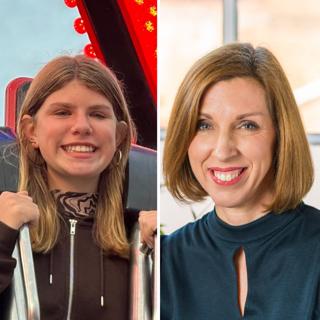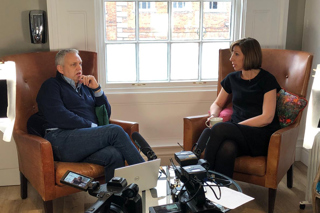
228 - Exercise ‘snacks’ and menopause with Lavina Mehta MBE
Personal trainer, wellness coach and mum-of-three Lavina Mehta MBE joins Dr Louise in this week’s episode to share her advice on boosting your activity levels during the perimenopause and menopause. As a British Asian, Lavina is passionate about ensuring her message of the benefits of exercise reaches all communities, and highlights how exercise can treat, prevent and reduce the risks of chronic diseases like Alzheimer’s, diabetes and heart disease. Lavina encourages busy women to begin ‘exercise snacks’, which are short bursts of activity that can be slotted into full days. Finally, Lavina shares her three easy wins to improve future health: Start strength training and prioritise building your muscle mass over losing weight. Start off small with exercise ‘snacks’, which means adding little bite-sized chunks of exercise throughout your day. It all counts and it is never too late to start. Keep talking, keep learning, keep educating yourself and keep sharing your journey with everyone around you. For more about Lavina, visit her website and follow her on Instagram @feelgoodwithlavina, plus feel good workouts and exercise snacks on her YouTube channel @feelgoodwithlavina.
31 Okt 202333min

227 - Children and the menopause: the importance of talking
In this episode, Dr Louise speaks to the youngest of her three daughters, Lucy, about all things menopause. Lucy, 12, recalls making her mother an HRT tote bag when she was six, plus hiding in her room when there were arguments at home, when Dr Louise was struggling with her symptoms. Lucy shares her experience of having her mum in the public eye, gives Dr Louise sage advice for dealing with bullies and offers her views on why menopausal women need help to remain in the workplace. In a survey conducted for her book, Dr Louise discovered 75% of women had never discussed menopause in their home when they were growing up. Barriers included a lack of knowledge, embarrassment, lack of communication, being short on time and feelings of shame around the topic. While Lucy has had lots of conversations about the menopause at home, she reveals that school education on the subject was limited. But conversations with children about the menopause are important as they can help normalise it. This World Menopause Month, help us start the most menopause conversations – ever. Everyone’s menopause is individual and to help others understand and manage their menopause, we must break taboos, educate and start the conversation. How to get involved Have a conversation about the menopause Log your conversation on the balance app or website Share that you’ve got involved by tagging us on social media, using the hashtag #PauseToTalk
24 Okt 202323min

226 - From PMS to menopause: why we need to talk about hormones
Content advisory: this podcast episode contains themes of mental health and suicide* It’s a family affair on this week’s podcast as Dr Louise is joined by her eldest daughter Jessica for a special episode on the eve of World Menopause Day. Jessica talks frankly about the impact of PMS and coping with hormone changes with migraine, as well as the strategies that helped her. Mother and daughter also discuss the importance of demystifying menopause and hormone changes through honest conversations between families, friends – and even complete strangers. This World Menopause Month, help us start the most menopause conversations – ever. Everyone’s menopause is individual and to help others understand and manage their menopause, we must break taboos, educate and start the conversation. How to get involved Have a conversation about the menopause Log your conversation on the balance website Share that you’ve got involved by tagging us on social media, using the hashtag #PauseToTalk *Contact the Samaritans for 24-hour, confidential support by calling 116 123 or email jo@samaritans.org
17 Okt 202333min

225 - Cardiovascular disease, osteoporosis and HRT
This week, Dr Louise speaks to Italian Menopause Society president Dr Marco Gambacciani. Early in his career Dr Marco specialised in reproductive endocrinology. He became interested in the occurrence of cardiovascular disease and osteoporosis during the menopause, and his menopause clinic was the first in Italy to have a bone density scanner. On a personal level, Dr Marco saw the devastating effects of osteoporosis first-hand after his grandmother was diagnosed with the condition. Dr Marco also shares his frustrations on the lack of understanding of how hormones can affect women’s cardiovascular health. On a more hopeful note, he is urging the Italian government to make menopause clinics available all over Italy. Finally, Dr Marco shares the three reasons why he believes women should consider HRT when they're younger: To improve quality of life. By reducing menopause symptoms, you improve quality of life and you help prevent chronic diseases. To help improve your performance at work – why should a woman have to lose opportunities just because she's having flushes or not sleeping well? It’s important for women to maintain the possibility of an enjoyable sex life – low oestrogen levels can lead to low sexual desire or painful sex. Follow Dr Marco on Instagram @m.gambacciani This World Menopause Month, help us start the most menopause conversations – ever. Everyone’s menopause is individual and to help others understand and manage their menopause, we must break taboos, educate and start the conversation. How to get involved Have a conversation about the menopause Log your conversation on the balance website Share that you’ve got involved by tagging us on social media, using the hashtag #PauseToTalk
10 Okt 202335min

224 Confidence in the Menopause: introducing our revamped course
October marks World Menopause Month, and on this week’s podcast, Dr Louise is joined by Newson Health colleague Dr Penny Ward to talk about the relaunch of our Confidence in the Menopause. Confidence in the Menopause is a CPD-accredited online course from Newson Health which is designed to increase your knowledge of, and confidence in, managing all aspects of the perimenopause and menopause. The course contains free and subscriber-only modules and is designed not only for those working in healthcare: it’s for everyone. We’ve included tailored information for non-healthcare professionals, whether you are a woman looking for information to help you make the right decisions and get the most out of their healthcare consultations, or a partner, friend or colleague who simply wants to know more. Dr Penny’s top three reasons for completing Confidence in the Menopause: It will give you an understanding what is inevitably going to happen to your own body or a loved one's body if you're a partner, friend or colleague. You will be able to appreciate the wide variety of symptoms that women can experience whilst undergoing hormonal changes. It’s an opportunity to listen to the presentations, particularly the one that is dispelling the myths about the menopause and HRT to understand exactly what's gone before us. Find out more about Confidence in the Menopause here This World Menopause Month, help us start the most menopause conversations - ever. Everyone’s menopause is individual and to help others understand and manage their menopause, we must break taboos, educate and start the conversation. How to get involved Have a conversation about the menopause Log your conversation on the balance website Share that you’ve got involved by tagging us on social media, using the hashtag #PauseToTalk
3 Okt 202329min

223 - OCD, depression and the menopause
Content advisory: this podcast contains themes of mental health and suicide. On this week’s episode of the Dr Louise Newson Podcast, Anna Geldard shares her story of how her mental health was severely affected by menopause. Anna tells Dr Louise how therapy and medication had helped her successfully manage her obsessive compulsive disorder (OCD) and mild depression symptoms for over a decade. But out of the blue, Anna’s symptoms returned and quickly spiralled. Anna was admitted to hospital, on six psychiatric drugs but still didn’t feel better. Thankfully, after learning about the impact of hormones on mental health and being prescribed HRT, things changed for the better. Anna’s top three tips: 1. Have more open conversations, starting from at home with the kids. This will filter through society, making menopause less of an unspoken thing and more of a just another thing about the body. 2. Make sure your resources are evidence based. There's a lot of information on social media, so just make sure that whoever you're listening to is appropriately qualified. 3. Advocate for yourself. If your symptoms are hormone related and you're being told you're too young or whatever, try again and don't just give up at that first hurdle. Anna is on Instagram @Hormones.on.her_mind. Find out more about OCD through charities OCD-UK and OCD Action. Contact the Samaritans for 24-hour, confidential support by calling 116 123 or email jo@samaritans.org
26 Sep 202330min

222 - Empowering women unheard during menopause
In this week’s podcast, food writer, author and award-winning entrepreneur Freda Shafi talks about her work raising awareness of menopause, and recording the experiences in the Pakistani community in West Yorkshire. Freda shares her own menopause story, and she and Dr Louise discuss key barriers women face accessing care, and ways to improve knowledge to empower women to advocate for themselves. ‘I'm a South Asian woman, I'm a Pakistani, I'm a British Pakistani woman, and I know I represent a certain demographic,’ says Freda. ‘I feel as though I can reach many women through the fact that I am from the community. That may be platforms for women like myself who are able to cascade that information and let that reverberate across those communities.’ Freda’s top three tips: Help represent your community to spread awareness of menopause symptoms, treatments and services and help tackle the stigma that still surrounds this area. Get a second opinion if you don’t feel your healthcare professional has given you the right diagnosis. Explore the materials that are out there, including the balance app, so that you’re informed when you see your doctor. Boost training in the menopause for community leaders so that they can signpost women to local services that can help support them. Follow Freda on Instagram @fredishafi_spiceitup
19 Sep 202331min

221 - Emma Kennedy: the menopause, the speculum and me
Bestselling author, screenwriter and TV presenter Emma Kennedy joins Dr Louise Newson in this episode to talk candidly about her menopause experience. Emma describes how she thought she had got through her menopause when terrifying heart palpitations and anxiety struck. After always being fearful of HRT due to a strong family history of breast cancer, a careful and detailed discussion with a GP around the risks and benefits led to her starting a low dose of hormones. ‘It's the first time I've ever cried in front of a doctor,’ she says. ‘Ever, ever. I felt that terrible. [But] Just that tiny amount of estrogen and the heart palpitations stopped in 48 hours and they haven't come back. It's like a miracle.’ Dr Louise and Emma talk about the importance of a personalised discussion between a doctor and a patient to assess whether and what type of HRT may be the right choice. Emma also talks about the lifestyle changes she has made to reduce breast cancer risk and help control menopausal symptoms. Emma, who wrote the bestselling The Tent, The Bucket and Me, also talks about her frustration with the pain and discomfort women are often expected to put up with during routine procedures. She gives a stirring call to action for the speculum – the device used in many intimate procedures – to be, at the very least, radically improved. For more about Emma visit her website and you can follow her on Instagram @emma67 or Threads @emmak67.
12 Sep 202330min





















